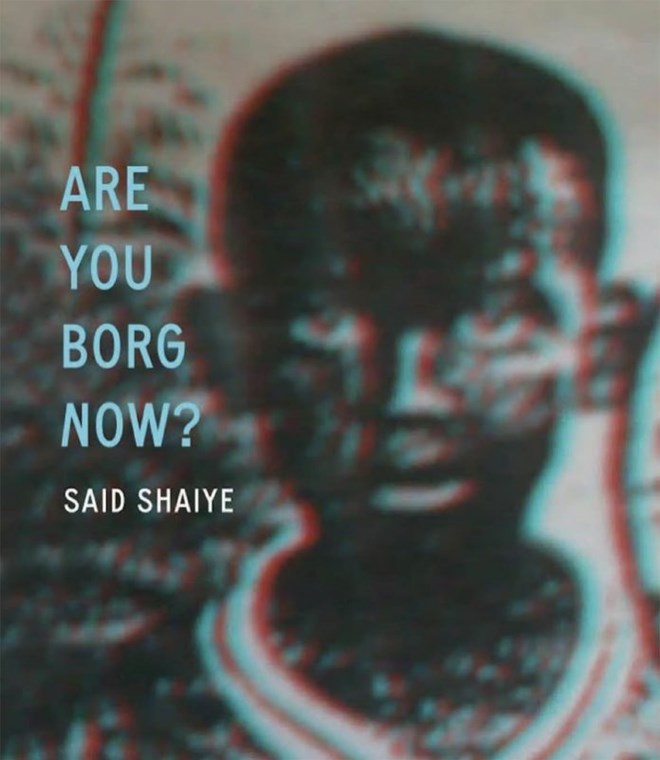
Sunday February 5, 2023
By Glen Retief

In some ways, Somali American memoirist Said Shaiye would clearly prefer to be a computer, “free of pain”. Or perhaps he feels halfway there. At one point in his fascinating and frustrating debut Are You Borg Now?, he confesses to a refugee’s limited emotional range, much like his Star Trek heroine, Seven of Nine.
In recent years, the United States has provided platforms for African immigrant authors such as Teju Cole, Chimamanda Ngozi Adichie and Ishmael Beah. But Muslim and North African perspectives like Shaiye’s have remained relatively underrepresented. So have memoirs focused less on national and social struggles, and more on intimate, personal concerns such as faith and addiction.
advertisements
As such, Shaiye’s dedication of Borg seems to serve as a kind of flag-raising, differentiating this work from the more secular and political stories in mainstream Afro-lit. “In the name of Allah,” Shaiye writes, going on to give thanks for the “gift of writing, which has helped me weather many a dark storm”. He declares, “I am a survivor of childhood trauma, of genocide, of civil war … of serious addiction.”
But this trauma turns out to be nothing like, say, Beah’s experiences of being a drugged-up child soldier, relayed in A Long Way Gone. A series of scanned immigration documents show that Shaiye was, in fact, admitted to the US as a refugee in 1991, at the age of two and a half. This is too young to have formed substantial memories of the Somali civil war. So what has Shaiye lived through?
One obvious trauma is the racism of the US, where black people coped with the “generational genocide” of slavery, segregation, mass imprisonment and police brutality, earning the right “with their bodies” for Africans like Shaiye to obtain refuge.
The US is a place where, as a teenager in Seattle, he gets rejected by Vietnamese girls because they are “into white boys”. The US is also a place where, in his creative writing programme, Shaiye has to absorb critiques that he doesn’t believe in from white people. At least one reason for Shaiye’s alienation appears to be that his classmates are “the least religious people on this Earth”.
Family also challenges him. Borg talks about how “family is hard” and yet is also “everything”. Shaiye compares his family to the crew of the Voyager, headed to Earth from the far side of the galaxy.
Crucially and deliberately, however, this memoir leaves its author’s trauma unnamed. In an interview, Shaiye talks about refusing to “perform trauma” in the way that his white, American, secular readers expect of a Somali refugee.
Unwilling to address such readers, Shaiye instead writes Borg in the form of a dialogue between the narrator and “Phantom Voice,” a device that is also “the second voice in my writing”.
This voice is a familiar one for memoirists, who regularly talk about the younger self undergoing the experiences being described, and the older one, who reflects. Classic memoirist Vivian Gornick, for example, talks about the “situation” — the literal incidents — and the “story” — emotional meaning.
In Borg, though, few specific experiences are narrated. Instead, we get summaries — high school “did a number” on the narrator; the narrator “can’t get decent sleep”; he worries what people think of his writing.
Perhaps because these problems seem so current, “Phantom Voice” ends up coming across more as a peer narrator than an older one. The narrator and the voice address each other as “bro” and speak in the hip-hop inflected, macho dialect of contemporary black male slang.

“Say bro.”
“How you been, man?”
“I can’t call it. You know how it is out here.
“I really do, tho. It’s been a few days, huh?”
“Yeah, not sure what’s been keeping me from [writing this memoir].”
At its worst, this inner dialogue seems to replace a formulaic performance of trauma with an equally predictable, theatrical, emotionally avoidant masculinity. At its best, though, this self-talk bursts off the page with poignant freshness.
“Sometimes I write a sentence so strong it forces me to go outside and do pushups in the cold. It forces energy out of me, or into me, and it has to be released.”
The overall effect of this style of writing was both stimulating and alienating. On the one hand Borg is interesting, bold, original, and rebellious. On the other, it also keeps the reader at a distance, refusing vulnerability and therefore limiting connection.
After all, even Seven of Nine longs to be flawed and human, to relate to her crew mates.
Are You Borg Now? represents a first step in this direction, but a strikingly incomplete one. Are You Borg Now? by Said Shaiye, Really Serious Literature, R482.